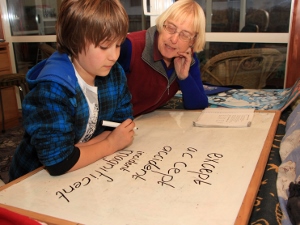

<p><img class=" alignright size-full wp-image-1287" src="http://schoolnewsnz.fastrackdev.com/wp-content/uploads/2015/02/SND12-wk4-EDUCATION-Dyslexia-_SPELD__300x225.jpg" alt="SND12-wk4-EDUCATION-Dyslexia- SPELD 300x225" style="margin: 5px; float: right;" width="300" height="225" />Specialised, early intervention can significantly boost success at school for a child with dyslexia, according to research. One-on-one, personalised tuition resulted in vast and surprising improvements in achievement skills, according to Dr Karen Waldie, Associate Professor of the School of Psychology at Auckland University.</p>
<p> <!--more--> </p>
<p>SPELD NZ, in collaboration with school RTLBs (Resource Teachers of Learning and Behaviour), carried out a pilot study involving 42 seven-year-old students struggling in the classroom as a result of dyslexia.</p>
<p>Dr Waldie analysed the resulting data and says she was taken by surprise.</p>
<p>&#8220;I knew that I would find that students would increase their reading skills after SPELD lessons. What I didn&#8217;t realise, however, was just how successful the pilot programme would be.</p>
<p>&#8220;The children increased their predicted reading success by 20-44 per cent in areas of sound blending, phonemic awareness, verbal comprehension and reading fluency. However. their general cognitive abilities also significantly improved. We saw vast improvements in thinking ability, cognitive fluency and processing speed. I am truly impressed.&#8221;</p>
<p>The New Zealand Journal of Educational Studies published the research findings, noting the improvement of cognitive efficiency and processing speed was &#8220;testament to the ability of the brain to be modified, presumably via strengthened neural connectivity, following even a relatively brief (60 session) exposure to an enriched environment in the form of SPELD intervention&#8221;.</p>
<p>The students in the study came from a variety of schools, ranging from decile 1 to decile 10. They received 60, 45-minute sessions of one-on-one tuition, twice weekly, from SPELD NZ teachers. Each child had assessments of their academic and cognitive abilities before and after the 60 lessons using the Woodcock-Johnson III (WJIII) test battery.</p>
<p>SPELD NZ&#8217;s chairperson Marion Fairbrass says although the sample size was small, it was a first step and the findings were very encouraging.</p>
<p>&#8220;They indicate that specialised teaching, built on solid foundations, can make a strong contribution to those with dyslexia and to the wider education sector.</p>
<p>&#8220;The pilot programme proves that by investing in our under-achieving seven-year-olds, we can help them achieve literacy and success at school. As dyslexia and other specific learning disorders can be hereditary, this could have a flow-on intergenerational effect. Can we afford NOT to help these children?&#8221;</p>
<p>The research findings will be used to develop and underpin similar studies planned for the future.</p>

Since 2015, fewer students are completing secondary school, defined as remaining enrolled in education until…
As the country’s Indian population grows, so does demand for Indian languages like Hindi, Punjabi…
By promoting alternate qualifications, some schools may have undermined public trust in NCEA, explains an…
When young people immerse themselves in nature, they leave feeling physically, mentally, emotionally and spiritually…
Theatre is much more than performance. Deep skills can be developed across multiple curriculum areas,…
NZCER found generative AI tools are frequently used to support teaching and learning in primary…
This website uses cookies.